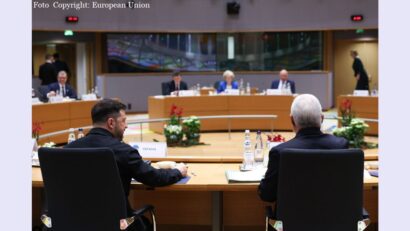Political agreement on funding the Romanian army
Romanian President Klaus Iohannis has agreed with all parliamentary parties in Bucharest to increase the funds allocated to the Defense Ministry.

România Internațional, 13.01.2015, 14:18
Romanian President Klaus Iohannis has started to apply the consensus model he promised in the election campaign prior to the November 2014 presidential election, when he was elected president of Romania. After 10 years when his predecessor, Traian Basescu, ruled Romania without hiding his likes and dislikes or political idiosyncrasies, the former Liberal leader Iohannis has now brought a balanced and equidistant approach to the parties, standing above the low-stake disputes in Parliament. On Monday he obtained the consensus of all parliamentary parties on at least 2% of the GDP to be allocated to defense each year, starting from 2017 until 2027. In his capacity as supreme commander of the armed forces, the President said that it was necessary for the budget of the defense ministry to increase because Romania needed to be prepared, given the developments in neighboring Ukraine.
A member of the EU and NATO, Romania should not rely on its allies alone for ensuring its own security, Romanian President Klaus Iohannis also said:
Klaus Iohannis: “We have the duty to address the situation in the region with maturity and to show that we are a responsible nation. That is why we believe that we need to provide the Romanian army with the necessary means so that it should benefit from the necessary funds for training and endowment with modern equipment.”
Number 1 in the government coalition that was instated in Romania almost 3 years ago, the Social Democratic Party, that has the defense portfolio, has unflinchingly supported the president’s initiative. Here is the Social Democrat Prime Minister Victor Ponta:
Victor Ponta: “We want what we started in 2012, namely more money for the defense ministry each year, to be a long-standing process, assumed by all political parties, irrespective of whether they are in the ruling coalition or in opposition.”
The successor of Klaus Iohannis to the helm of the Liberal Party, Alina Gorghiu, has hailed the political agreement proposed by the Romanian President:
Alina Gorghiu: “We have the guarantee that, this time, at the initiative of the Romanian President, this agreement will become a fact, and that Romania will pass over the enthusiasm of being a NATO member and take the responsibility stemming from NATO membership.”
The agreement on increasing the funds for the defense ministry has been supported by all political parties in Romania, as well as by the parliamentary group of national minorities, which is a rare thing in the Romanian politics of the past years. Analysts say that this agreement could be the start of a new way of managing the major files of the Romanian administration.






























